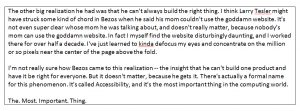The reason I began this book with EA, and why I started off everything with the concept of the core diagram is because we (government agencies) are good at making a bunch of one-offs. What I mean by this is that we develop applications or even systems that meet a single proprietary need. And don’t misunderstand, that need is probably real and important. But the fact of the matter is that it is a one-off. I am really fired up about this issue. I’m probably not as fired up about it as Steve Yegge. Steve is an employee at Google and he used to work for Amazon. You absolutely need to go and read his rant now. Go ahead, I’ll wait.
To find it, search for: Steve Yegge rant.
It is about 4,500 words, most of it is bat-shit crazy, but a real nugget is in there. If you didn’t go and read it, and you thought you could just skip ahead and continue with this piece, don’t cheat. You are only cheating yourself out of one of the best rants ever.
The way he starts off, it seems like he is pretty critical of Amazon and the way they approach things. I remember the first time I read it, which was at the height of the world’s infatuation with Google, 2012, I was certain that Google would emerge as the virtuous company. But actually, in this piece, Google is the villain. It is Bezos at Amazon who made the edict:
1) All teams will henceforth expose their data and functionality through service interfaces.
2) Teams must communicate with each other through these interfaces.
3) There will be no other form of interprocess communication allowed: no direct linking, no direct reads of another team’s data store, no shared-memory model, no back-doors whatsoever. The only communication allowed is via service interface calls over the network.
4) It doesn’t matter what technology they use. HTTP, Corba, Pubsub, custom protocols — doesn’t matter. Bezos doesn’t care.
5) All service interfaces, without exception, must be designed from the ground up to be externalizable. That is to say, the team must plan and design to be able to expose the interface to developers in the outside world. No exceptions.
6) Anyone who doesn’t do this will be fired.
This is a pretty iron-fist management tactic. “Thou shalt do this or seek employment elsewhere.” But what you see from an evolutionary perspective is that everything at Amazon starts to work together. This is so important because people at Amazon were building applications to meet their very specific and parochial needs, not having an eye on how their capabilities or data could be used elsewhere. But by developing like this, they were creating capabilities that could be leveraged across the enterprise.
The reason this is important is because Jeff Bezos learned something:

This is a broad use of the term accessibility. Typically when we think about accessibility we think about blind people using an interface or deaf people listening to narration. In this instance, Yegge is using the broader term for accessibility to include how people want to interact with technology.

